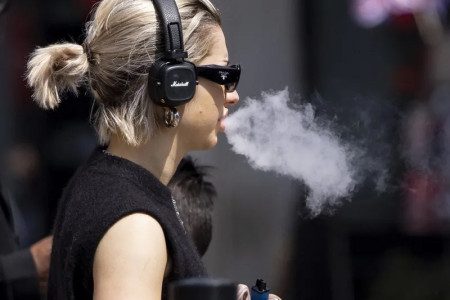New laws to stop single-use vapes from being made, advertised, and supplied in the country will also be introduced.
It comes amid a broader push to phase out recreational vaping completely.
Vaping has been marketed as a way to quit smoking, but Australia's health minister says it has created a "new generation of nicotine dependency".
Vapes, or e-cigarettes, are lithium battery-powered devices that have cartridges filled with liquids containing nicotine, artificial flavourings, and a range of other chemicals.
It has been illegal for any Australian to purchase or import e-cigarettes or nicotine vapes without a doctor's prescription since 2021, but despite those restrictions rates of addiction have continued to skyrocket.
A study from the University of Sydney earlier this year found that over a quarter of teenagers aged 14-17 had vaped, while research from Australia's Cancer Council charity found that nine out of 10 teenagers in the same age group found it easy to access nicotine vapes.
"All Australian governments are committed to working together to stop the disturbing growth in vaping among our young people," said Mark Butler, the federal health minister who is leading the ban.
In May, the Australian government signalled its intention to phase out the use of single-use vapes, but until now it had provided no concrete timeline.
Mr Butler says that the import ban on disposable vapes will start on 1 January, and that by March refillable non-therapeutic vapes will also be banned from entering the country.
Importers and manufacturers supplying therapeutic vapes will also have to comply with tighter government regulation concerning the flavours, nicotine levels, and packaging of their products.
Experts have warned that not enough is known yet about the long-term impacts of vaping.
Research from Johns Hopkins University has linked the practice to chronic lung disease and asthma.
And in Australia, scientists who have studied the liquids used in vapes have warned that they contain "a suite of chemicals" known to impact lung health.
Australia's announcement comes just days after New Zealand's government scrapped its world-leading smoking ban to pay for tax cuts.
By Hannah Ritchie
BBC News, Sydney


